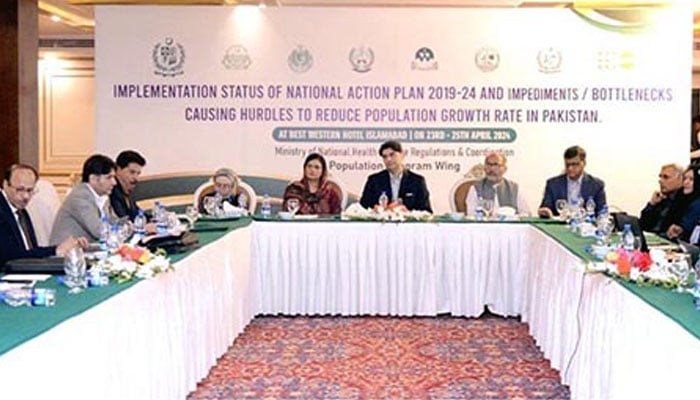‘Population growth rate at alarming pace despite action plans’
ISLAMABAD: Despite development of a nation and provincial action plans for population control, Pakistan’s population growth rate increased from 2.40% in 2017 to 2.55% in 2024 due to limited access to family planning services, high fertility rate, lack of women empowerment, unawareness and poverty, officials and experts said on Tuesday.
Deploring that unmet need for family planning was 17.3 percent in Pakistan where couples of child bearing age who are not using contraception due to lack of access, they warned that Pakistan’s population is projected to reach around 335 million by 2050 under medium-fertility variant projections despite decline in fertility rate over the years.
They were speaking at opening session of a three-day workshop titled “Implementation Status of National Action Plan (NAP) on Population (2019-24) and Impediments/Bottlenecks Causing Hurdles to Reduce Population Growth Rate in Pakistan” organized by Population Programme Wing, Ministry of National Health Services, Regulations and Coordination in Islamabad.
Speaking at the opening session, Prime Minister’s Coordinator on Health Dr Mukhtar Barath said growth rate was increasing at an alarming pace in Pakistan despite action plans and different kinds of interventions and called for highlighting the challenges and hurdles in rise in population growth in the country.
“Prime Minister Shehbaz Sharif is very much concerned about polio, family planning and nutrition status in the country”, Dr. Barath said and extended his gratitude to all the participants and conveyed special appreciation to UNFPA for their steadfast support concerning population and family planning issues in Pakistan.
He highlighted the urgent concerns he inherited, including polio, family planning, and nutrition and emphasized the importance of convening all stakeholders to collectively address these challenges through collaborative problem-solving by acknowledging the limitations posed by the 18th Constitutional Amendment.
He advocated for a comprehensive strategy endorsed by all stakeholders to tackle the issues such as unmet needs, universal coverage, and unwanted pregnancies and proposed integration of population welfare and health departments at provincial levels as well as merger of Lady Health Worker’s programme in the population welfare department.
Dr Barath further called for incorporating family planning into the Expanded Programme on Immunization (EPI) to enhance service delivery and encouraged participants to share insights and obstacles from their respective provinces, acknowledging their expertise and diverse perspectives.
He urged participants to focus on practical issues which can be addressed rather than contentious issues like the NFC or matters affecting national security and unity and hoped that collaborative efforts would yield meaningful recommendations and pave the way for advocacy at the provincial and regional levels, extending gratitude once again to the UNFPA for their unwavering support.
Representatives from provincial population welfare and health departments as well as representatives of CSO’s, NGO’s and donor organizations including UNFPA are attending the three-day moot.
-
 Catherine O’Hara’s Cause Of Death Finally Revealed
Catherine O’Hara’s Cause Of Death Finally Revealed -
 Swimmers Gather At Argentina’s Mar Chiquita For World Record Attempt
Swimmers Gather At Argentina’s Mar Chiquita For World Record Attempt -
 Brooklyn Beckham, Nicola New Move Could Leave David, Victoria Reeling
Brooklyn Beckham, Nicola New Move Could Leave David, Victoria Reeling -
 Anthropic Criticises ChatGPT Ads As OpenAI Begins Testing Advertising In AI Chats
Anthropic Criticises ChatGPT Ads As OpenAI Begins Testing Advertising In AI Chats -
 YouTube Star MrBeast Acquires Step: Redefining Finance For Gen Zs
YouTube Star MrBeast Acquires Step: Redefining Finance For Gen Zs -
 Sarah Ferguson Plans Big Move To Cause ‘serious Damage’ To Andrew
Sarah Ferguson Plans Big Move To Cause ‘serious Damage’ To Andrew -
 Trump Nears 500 Press Interactions In His Second Term, Surpassing Former President Biden
Trump Nears 500 Press Interactions In His Second Term, Surpassing Former President Biden -
 Hailee Steinfeld Reveals Her Plans To Return To Music
Hailee Steinfeld Reveals Her Plans To Return To Music -
 Elon Musk Unveils SpaceX Plan For Civilian Moon, Mars Trips
Elon Musk Unveils SpaceX Plan For Civilian Moon, Mars Trips -
 MTG Commander Banned Update: Wizards Frees Infamous Instant-win Card
MTG Commander Banned Update: Wizards Frees Infamous Instant-win Card -
 Royal Family Braces For ‘final Blow’ As Andrew Scandal Deepens
Royal Family Braces For ‘final Blow’ As Andrew Scandal Deepens -
 Snow Forecast Warns Of Reduced Visibility And Travel Risks In Ontario
Snow Forecast Warns Of Reduced Visibility And Travel Risks In Ontario -
 Margot Robbie Reveals 'worst' Gift She Received From Co-star
Margot Robbie Reveals 'worst' Gift She Received From Co-star -
 Casey Wasserman Says He ‘deeply Regrets’ Ghislaine Maxwell Emails After DOJ File Release
Casey Wasserman Says He ‘deeply Regrets’ Ghislaine Maxwell Emails After DOJ File Release -
 Discord Face Scan Age Verification Rules Explained As Platform Tightens Access
Discord Face Scan Age Verification Rules Explained As Platform Tightens Access -
 Cavaliers Vs Nuggets Showdown Heats Up After Blockbuster Trade
Cavaliers Vs Nuggets Showdown Heats Up After Blockbuster Trade




